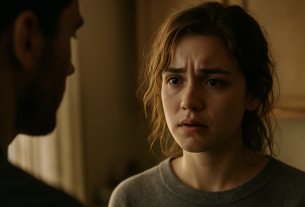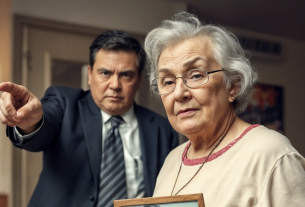Svetlana wiped the sweat from her forehead and looked at the clock. Half past five. There were still thirty minutes left in the workday, but no one was left outside the medical station. The April sun pierced through the blinds, casting striped shadows on the old linoleum. The paramedic stretched, loosening her stiff back. The day had been tough — in the morning she had to go to the far end of the village to see Petrovna for high blood pressure, then mothers with children started coming, followed by Mitrich with a chronic cough, and by lunchtime they brought in a farm mechanic with a cut hand.
Svetlana carefully stacked the medical cards, wiped the table, and turned off the computer. She could have stayed a little longer to fill out the journal for tomorrow, but after yesterday’s long shift, she simply had no strength left. One thought hammered in her head — home, get home faster. There she still needed to cook dinner, wash the laundry, hang it outside before it got dark. And then — whatever happens. Maybe she’d have time to just sit and be silent.
Leaving the medical station, Svetlana looked around almost mechanically. The village was living its usual life. Men smoked outside the store, discussing the latest news. Grandma Zina was hanging laundry, frequently glancing around to see if she was missing anything interesting. Somewhere dogs were barking. Svetlana headed to her house at the opposite end of the village’s only long street. The walk took ten minutes.
“Anton, I’m home!” Svetlana called as she opened the gate.
Her husband didn’t respond, although his old UAZ was parked in the yard. “So, he’s lying with his phone again,” thought Svetlana as she entered the house. And sure enough. Anton was sprawled on the couch, buried in his smartphone screen, not even turning his head.
“What’s for dinner?” the husband asked without looking away from the phone.
“I’ll make something now,” Svetlana replied tiredly, kicking off her work shoes and heading to the kitchen.
Opening the fridge, she sighed. It was pretty empty. She’d have to stop by the store after her shift tomorrow. For now, she could make potatoes with canned stew — quick and filling.
“Will you make soup?” came from the other room.
Svetlana pursed her lips. Soup would take at least an hour. And she still had to do laundry.
“Maybe soup tomorrow? I’ll make potatoes today,” she suggested.
“Potatoes again,” Anton grumbled unhappily. “Mother made cabbage soup with meatballs yesterday. Delicious!”
Svetlana said nothing. What was there to say? Her mother-in-law, Nina Petrovna, spent the whole day cooking, unlike her. But she didn’t want to argue. It was easier to just make that damn soup.
While the water boiled, Svetlana quickly changed clothes and took the basket of washed laundry outside. She had to hang it almost in the dark, but there was no other choice. Returning to the kitchen, she began peeling potatoes. Her mind spun with tomorrow’s call schedule — she’d need to visit Semenovna to check her blood pressure, then Kolka after chickenpox…
“You over-salted it again,” Anton grimaced, tasting the soup an hour and a half later.
“Give me,” Svetlana took a spoonful and tasted it. “Seems fine.”
“It’s always fine for you,” her husband muttered. “Aunt Lida’s soup is never too salty.”
Svetlana sighed. Aunt Lida — her mother-in-law’s sister — was a local culinary legend. Everything she made turned out perfectly. At least, that’s what Anton thought. And he reminded her of it at every opportunity.
“Listen, maybe you’ll start digging the garden tomorrow?” Svetlana asked cautiously, clearing the dishes. “All the neighbors are already planting beds, and we haven’t even started.”
“There’s still time,” Anton waved her off. “It’s still cold.”
“But it’s already late April…”
“I told you — there’s time!” her husband snapped irritably. “Why are you nagging? Acting like the commander.”
Svetlana was silent again. She didn’t have the strength to argue. Six months ago, Anton quit the sawmill, saying they paid peanuts and the work was heavy. He promised to find a job in a nearby town where a new workshop was opening. But first, there was no suitable vacancy; then the conditions weren’t to his liking; then something else… As a result, the whole house and farm ended up on Svetlana’s shoulders.
“Svetlana, you’re a woman,” the neighbor Klavdia Semenovna used to say. “Who else will hold it all together? Men can’t do it. They’re like little kids.”
Svetlana nodded and agreed. It was easier that way. But inside, something heavy and suffocating was growing, something nameless.
In the evening, after finishing housework, Svetlana sat in the kitchen with a cup of tea. It was dark outside. Her soul felt dull and empty. Anton was already snoring in the bedroom, not even asking if she was done with the laundry or needed help.
“But once everything was different,” Svetlana thought, stirring sugar into her tea. Anton used to be attentive, caring. He would carry her in his arms, bring flowers from the village entrance flowerbed, make surprises. When did everything change? After the wedding? Or when they moved from the city to this village, closer to his mother?
The phone gave a short chime. A message from Olga, a school friend who lived in the neighboring village.
“Will you be at our store tomorrow? Let’s meet and hang out a bit. I baked a charlotte.”
Svetlana smiled. Olga was always the life of the party, easygoing. They hadn’t seen each other for two months, only exchanged messages occasionally.
“I’ll stop by after lunch for sure,” Svetlana replied.
The next day, work went as usual. Near noon, Nina Petrovna called, asking what Svetlana was making for dinner. Svetlana answered reservedly that she hadn’t decided yet. Her mother-in-law snorted and said Anton liked cutlets with mashed potatoes, like when he was a child.
“I thought he’d grown up already,” Svetlana thought bitterly but only thanked her for the advice.
By three o’clock, the main tasks were done. Svetlana locked the medical station and headed toward the neighboring village. It wasn’t far — about three kilometers along a dirt road. The weather was nice and sunny. For the first time in a long time, Svetlana felt something like joy. No work, no worries — just the road, the sun, and a meeting with her friend ahead.
Olga was waiting by the store, sitting on a bench. Seeing Svetlana, she smiled broadly and waved.
“You look tired,” Olga said, hugging her friend. “They really wear you out over there?”
“Yeah, as usual,” Svetlana shrugged. “Work, home, garden soon…”
“Does Anton help?”
Svetlana shrugged again. She didn’t want to talk. Especially about her husband.
“Alright, come to my place,” Olga pulled her friend by the hand. “I bought such tea — you’ll lick your fingers!”
Olga’s house was small but cozy. Flowers in pots everywhere, paintings on the walls that Olga had painted herself. In the living room corner — a TV, on the couch — Vasya the cat, who didn’t even stir at the sight of a guest.
“Sit down,” Olga pointed to an armchair. “I’ll put the kettle on. Tell me, how’s life?”
And unexpectedly, Svetlana began to talk. About how tired she was at work, how she carried the whole house alone, how Anton hadn’t worked for six months and apparently had no intention of looking for a job. About how every dinner turned into a test of her cooking skills, and any request for help hit a deaf wall of indifference.
“Why do you put up with it?” Olga asked, pouring tea into cups. “I would have told him everything long ago.”
“Who needs that?” Svetlana sighed. “Everyone just says: endure, you’re a woman. My mother, mother-in-law, neighbors — all in one voice.”
“So what?” Olga slid the plate with charlotte closer. “It’s easy for them to say. But how do you feel?”
Svetlana thought. Indeed, how did she feel? She was so used to ignoring her own feelings that she couldn’t immediately answer this simple question.
“I feel sick, Ol,” she finally admitted. “Like I’m not a person at all, but some kind of function. Cook, clean, wash, bring. And no thanks, no involvement.”
“Then talk seriously to him,” Olga suggested. “Maybe he just doesn’t understand?”
“I did,” Svetlana sipped her tea. “What’s the use? It starts anew. Two weeks of silence, then back to the same.”
Olga sighed sympathetically and poured more tea. In the cozy silence, almost two hours passed. Svetlana glanced at the clock but didn’t want to leave. Here, in Olga’s small house, it was calm and good.
The phone rang loudly, breaking the idyll. Svetlana looked at the screen and frowned. Anton.
“Yes, I’m listening.”
“Where are you roaming?!” came the irritated voice of her husband. “My relatives are sitting hungry! Aunt Valya and Uncle Kolya came, Lenka with her husband, the kids! Everyone’s waiting!”
Svetlana pulled the phone away from her ear — her husband was shouting so loudly.
“When will you come?” Anton demanded.
“I’ll be there soon,” Svetlana answered quietly and hung up.
Olga watched her friend carefully. Svetlana slowly put the phone on the table and sighed deeply.
“What happened?” Olga asked.
“Anton invited relatives. They’re sitting, waiting. Dinner was apparently supposed to cook itself,” Svetlana smiled bitterly.
“And you’re going to cook for all that crowd now?” Olga sounded amazed. “Seriously?”
“What else can I do?” Svetlana shrugged.
“Well, for example… nothing?” Olga suggested. “Let him deal with it. He invited them without telling you.”
Svetlana thought. Something stirred inside her, a string long silent. She suddenly imagined coming home to a bunch of people with hungry eyes. Everyone waiting for the paramedic, just back from work, to fuss over the stove to feed her husband’s relatives who didn’t even bother to warn her.
“You know,” Svetlana said slowly, “I’m not in a hurry.”
An hour later, the phone was bombarded with calls. Anton called every five minutes, but Svetlana didn’t pick up. Her mind was filled with a strange emptiness.
“Maybe you should stay at my place tonight?” Olga offered. “Morning is wiser than evening.”
Svetlana nodded. Then suddenly stood and said firmly: “I need to go home. But don’t worry, I won’t cook.”
Half an hour later, Svetlana opened the gate to her yard. Uncle Kolya, a short man with a red face and thick mustache, was smoking on the porch.
“Oh, the lady is here!” the relative rejoiced. “We’ve been waiting. Anton says you’re late.”
“Yes, a bit,” Svetlana nodded and went inside.
In the living room on the sofas sat Aunt Valya, a plump woman about sixty, her daughter Lena with her husband Sergey, and two boys about eight to ten years old, running around the room. Anton sat in an armchair, frowning. Seeing his wife, he stood up.
“Finally!” the husband exclaimed, trying to smile at the relatives. “We’ve all been waiting for Sveta here. She’ll quickly make something now.”
Svetlana passed by her husband without a word and went to the bedroom. There she took a sports bag from the closet and began methodically packing clothes — several blouses, pants, underwear, a warm sweater.
Anton appeared in the doorway, puzzled.
“What are you doing?” he asked in confusion.
Svetlana didn’t answer, continuing to pack.
“Sveta, are you upset?” the husband raised his voice. “Well, he didn’t warn you, it happens. You’ll cool down soon and everything will be fine.”
Svetlana zipped the bag and turned to her husband.
“I’m leaving,” she said quietly.
“Come on,” Anton waved her off. “We’ll talk later. The guests are hungry now.”
“You invited them, you feed them,” Svetlana replied, grabbing her bag.
Anton blocked her way.
“Where are you going? Don’t act rashly.”
Svetlana walked around him and went into the hallway. Everyone present watched her curiously. Aunt Valya whispered something to Lena.
“Sveta’s upset, she’ll cool down,” Anton loudly said to the room, as if apologizing to the relatives.
But when Svetlana calmly passed by the guests toward the exit without a word, her husband was bewildered.
“You… where are you going?” His voice trembled. “What about dinner?”
Svetlana didn’t even look back. Only at the door, already holding the handle, she calmly said:
“Bon appétit.”
And left, gently closing the door behind her.
Back at Olga’s, Svetlana couldn’t hold back a tremor. Her friend poured her a glass of liqueur and covered her with a warm blanket.
“How are you?” Olga asked, sitting beside her.
“Strange,” Svetlana admitted. “As if something inside snapped. But it doesn’t hurt. More like… relief.”
That night Svetlana couldn’t fall asleep for a long time. Not from worries — no. From a feeling of incredible freedom. For the first time in many years, her mind was not swarming with thoughts of tomorrow’s dinner, her husband’s un-ironed shirts, the broken fence. Now all that was no longer her concern. In the quiet room where she had been put to bed, there was more air than in their whole house over the past years.
In the morning, the news spread throughout the village. Klavdia Semenovna ran first to neighbor Agafya Petrovna:
“Did you hear? Sveta left Anton! Right in front of the guests! Packed a bag and left!”
“No way?” Agafya Petrovna threw up her hands. “What happened?”
“Who knows! Maybe Anton was cheating? Or something else…”
By lunchtime, rumors multiplied. Some said Anton had raised his hand against his wife, others said Svetlana found someone in the district center. Nina Petrovna went around the village with tearful eyes, telling everyone how ungrateful her daughter-in-law was.
A week later Anton showed up at Olga’s. Svetlana was just getting ready for work.
“We need to talk,” the husband said gloomily.
“I have to go to work,” Svetlana replied, zipping her jacket.
“Sveta, what kind of kindergarten is this?” Anton lost patience. “You made a scandal in public! In front of the relatives! Now the whole village is gossiping!”
“Let them gossip,” Svetlana looked Anton straight in the eyes for the first time. “You did it before — just didn’t shout. You humiliated me every day, quietly.”
“Are you crazy?” Anton was outraged. “When did I humiliate you?”
“Every time you demanded dinner without saying thank you. Every time you compared my cooking to Aunt Lida’s. Every time you refused to help because ‘it’s women’s work.’ Every time you invited guests without warning me.”
Anton stood speechless. His wife had never spoken to him in such a tone before. Calm, confident, without tears or hysteria.
“Please, leave,” Svetlana said quietly. “I have to work.”
Soon Svetlana rented a room from Maria Fedorovna, a local pensioner. The room was small but bright, with a separate entrance. The paramedic began taking more shifts, saving every penny. It was not easy, but Svetlana felt safe. No one shouted at her, didn’t demand dinner, or called with complaints.
A month later, a letter arrived in the mailbox from Nina Petrovna. The mother-in-law wrote in large letters: “You hurt everyone, you destroyed the family. Anton has completely fallen apart. Is this how decent women behave? In our time, this was unimaginable!”
Svetlana read the letter and threw it away without feeling the slightest guilt.
Over time, she heard rumors about Anton. Without his wife’s supervision, he began drinking more often. Relatives stopped visiting — it became uncomfortable. No one invited Anton to work — who needs a worker who is lazy and drinks? The village began to pity him — first the women, then the men.
And Svetlana lived her life. Woke up in the mornings, drank tea on the porch listening to the birds singing. No one demanded breakfast, accused her, or compared her to others. Maria Fedorovna turned out to be a quiet and delicate neighbor. Sometimes they drank tea together in the evenings, but more often Svetlana enjoyed the silence of her room.
Six months later, a message came from Anton: “You were right. I ruined everything.”
Svetlana read the message and just deleted it. Not out of anger — it simply no longer mattered.
One evening, sitting on Maria Fedorovna’s porch, Svetlana watched the sunset and thought about how strange life was arranged. Leaving turned out not to be an escape, but a return — to herself, to her desires, to peace. Not a loud slam of the door, but a quiet, yet decisive step became the most important in her life.
“I will no longer live for the convenience of others,” Svetlana said to herself then. And at that moment, she truly began to live.



